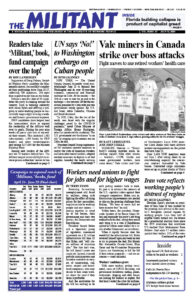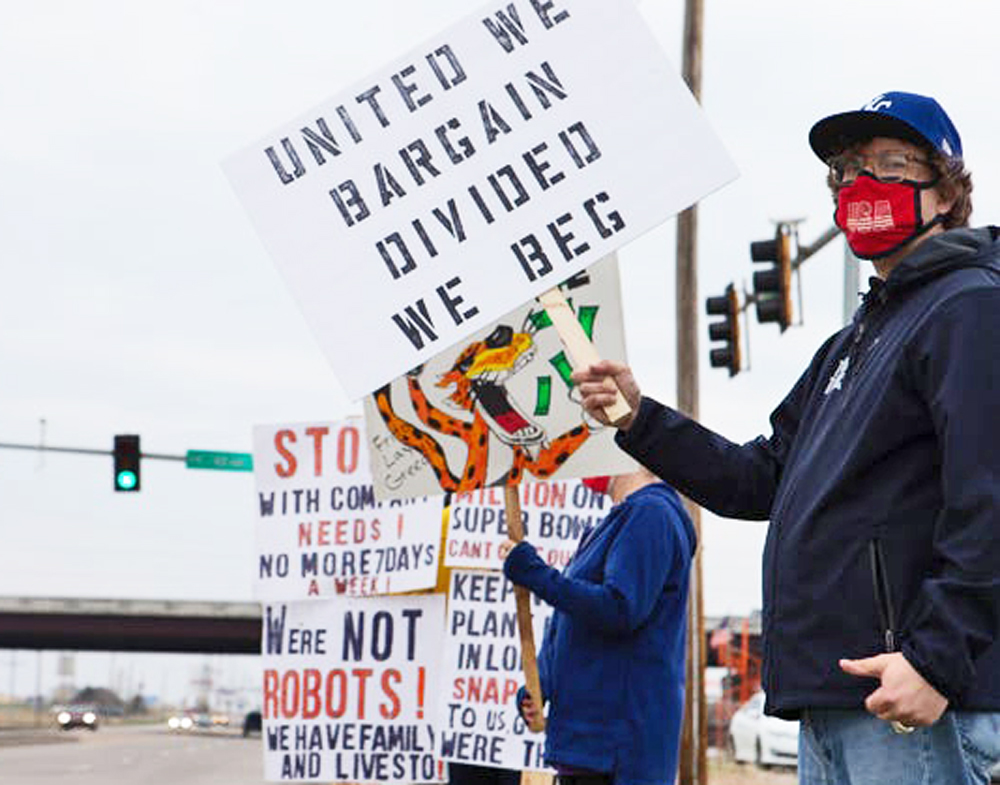Reversing far-reaching unemployment still faced by millions, along with fighting the effect of rising prices for key necessities, requires action by working people and our unions — joining together to stand up to the bosses, their government and their two parties, the Democrats and Republicans.
President Joseph Biden and a bipartisan group of legislators announced agreement on a $1 trillion infrastructure bill June 23 that Biden said “will create millions of American jobs.” But that isn’t true, the bill doesn’t create one single job. Instead, it would provide sizable payouts and lucrative contracts to owners of construction, rail, water, airport and broadband companies, who may decide to hire some workers down the road if they deem it profitable.
And the motivation for the bill has nothing to do with putting workers back to work. Its goal is to advance the interests of the U.S. capitalist rulers against their strongest competitors. Biden says infrastructure improvements are needed to take on the growing challenge from Beijing. “We have to move and we have to move fast,” he said.
Within hours, the president, Democratic Speaker of the House Nancy Pelosi and especially the party’s left wing walked back the deal, saying they would only bring it to a vote if Republicans agreed to trillions more dollars for a series of other Democratic social reforms.
When it rapidly became clear this would kill the infrastructure bill, Biden reversed himself again and went on tour to try to promote the deal. But liberals like Alexandria Ocasio-Cortez, Ilhan Omar and the 93-member Progressive Caucus are threatening to kill the bill if their reform proposals — and tax increases — aren’t included.
Workers’ confidence grows
With more workers getting vaccinated, cases of COVID declining, and government lockdowns ending, plants, restaurants, shipping and other bosses are looking for workers to exploit. But that hasn’t ended the crisis for millions. Despite a slow decline in unemployment, over 7 million workers who lost jobs way back in February 2020 are still out of work, and a total of 14.8 million workers still get by only by some form of government help. The current level of long-term unemployed is nearly double that of any other recession since the late 1940s.
But this continuing crisis for workers is of no concern to the bosses — as long as workers and their unions haven’t risen up in rebellion. Profit expectations of S&P 500 companies in the first quarter of this year soared to the highest level since records began being kept.
“Workers need a fighting program to unite workers both on the job and unemployed in common struggle,” Malcolm Jarrett, Socialist Workers Party candidate for Pittsburgh mayor, told the Militant. “That’s why my party calls for a shorter workweek with no cut in pay to share whatever work is available around. Unions need to mobilize workers to fight for 30 hours work for 40 hours pay!”
The bosses’ press is littered with complaints by employers that they can’t get enough workers to stay on or take the jobs they’re offering today. As hiring opens up, workers lose their fear of looking for better pay and conditions.
Angelic Hobart, who represents American Staffing at a St. Louis-area jobs fair, told the New York Times that workers’ “pay expectations are way over what their skill level is.”
That’s not how Elodie Nohone, who currently gets $15 an hour as a visiting caregiver, saw things at the fair. “They’re offering $10, $12, $13,” she said. “There’s no point in being here.”
Her boyfriend, Damond Green, holds two jobs, one at McDonald’s, where he gets $15 an hour, and another as a home health care aide. “I want to do something where my work is appreciated,” he said, “and pay me decent.”
The bosses hate — and fear — workers who think they are worth something more. “Clearly part of the problem now,” Katharine Abraham, a former commissioner at the Bureau of Labor Statistics, told the Times, “is that what employers and what workers think is out of whack.”
This gap also means there is more room for workers to fight for higher wages, better working conditions, steady shifts and a measure of respect. This is part of what is behind a number of recent strikes, like at Warrior Met Coal, Volvo Trucks and ATI steel. All these fights deserve broad support.
Workers face rising prices
Prices are rising at the fastest rate in over a decade, eroding the living standards of working people. Depending on which of two methods the government uses to calculate inflation, prices went up either 3.9% or 5% over last year in May. And neither of these calculations is based on the key necessities workers need, like food and gas, that are even higher.
The fact is that whenever prices start to go up, government bureaucrats rejigger how they report it to make it look smaller. “If we calculated inflation the same way we did in 1990, the inflation rate would currently be 8%,” Jared Dillon from Mauldin Economics wrote June 27. “If we calculated it the same way we did in 1980, it would be 13%.” Dillon adds, “Some critics view these changes as a purposeful manipulation.”
Workers need to fight to win pay raises that match the disastrous impact of inflation, a fight that can only be won by building and strengthening our unions and making alliances with other producers.
“The Socialist Workers Party calls for contracts with a sliding scale of wages to protect our living standards from inflation,” Jarrett said. “Every time prices go up, our wages, retirement and other benefits should match the increase automatically.
“We need to unite with farmers, small shopkeepers, independent truckers, housewives and consumers to form price committees and fight for power over price setting,” Jarrett said. “When the bosses complain about their problems to justify raising prices, we demand they open their books so we can see the real story, and demand control over the fixing of prices, which should be determined by our needs, not their drive for profits.”
“These demands can be won — and have been won in the past — if we are united and determined, and by how well we fight,” Jarrett said.


